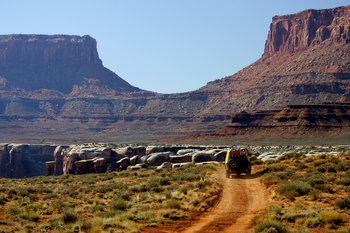SEMA News—August 2020
LEGISLATIVE AND TECHNICAL AFFAIRS
By Stuart Gosswein
FEDERAL UPDATE
 RPM Act: The Recognizing the Protection of Motorsports (RPM) Act clarifies that the Clean Air Act allows motor vehicles to be converted into dedicated race cars and that it is legal to produce, sell and install race parts for those vehicles. As Congress prepares to come back into session in September, the RPM Act enters a critical period. The legislation has strong bipartisan support, including 60 co-sponsors for the House bill (H.R. 5434) and 29 co-sponsors for the Senate bill (S. 2602), but lawmakers in Congress need to hear from SEMA members about why the bill is important to motorsports parts businesses in order to enact the bill into law in 2020. To contact your lawmakers and request their support, visit www.sema.org/rpm. Photo courtesy: Divin Serhiy/Shutterstock.com |
Tariffs: SEMA continues to call for tariff relief during COVID-19 as part of the Americans for Free Trade (AFT) coalition. The AFT first requested a temporary suspension of tariff collections so that companies could preserve cash and pay other bills. When the administration rejected the request, the coalition then sought an extended deferral of collections on all tariffs. To date, no decision has been made on the second request. In related news, the U.S. Trade Representative (USTR) continues to process requests by companies to be excluded from the Section 301 tariffs on Chinese imports. The requests are based on economic hardship and lack of product availability from other supply sources. The USTR has denied many requests, but exclusions that are granted are not company-specific. Rather, the exclusion applies to all imports under the Harmonized Tariff Schedule listing number, although the benefit may be narrowly applied to products with similar technical specifications and uses.
STATE UPDATE
Oklahoma—License Plates: The Oklahoma House of Representatives failed to pass SEMA-opposed legislation that would have required front and rear license plates on all vehicles prior to a required legislative deadline. Vehicles are currently required to display only a single, rear-mounted license plate.
Pennsylvania—Motorsports: The Pennsylvania House Committee on State Government passed SEMA-supported legislation that would allow outdoor recreational activities, including motorsports, to resume immediately under certain conditions. The bill now awaits consideration by the entire House of Representatives. Pennsylvania’s emergency business closure order currently does not allow any recreational activity businesses, such as spectator sports, to operate.
COVID-19 Updates
SEMA Website Provides Guidance on Business Reopenings
SEMA is reviewing daily the resources available to members for addressing COVID-19 to ensure that they are up to date, accurate, and address current business challenges. The focus and goal of the Coronavirus Updates & Resources webpage (www.sema.org/coronavirus) has shifted toward reopening and making plans to move forward. The resources include the latest information on which businesses can reopen state by state, guidance and best practices for businesses to safely reopen, and keeping members informed on the latest federal relief programs.
One of the first features the website provided was a guide to how each state defined “essential” businesses that would be allowed to remain open as the pandemic began and most other “nonessential” businesses were told to close their doors. Beginning in late April, governors began to release their plans for how and when their states would allow businesses to reopen.
 Maintenance Backlog on Federal Land: The U.S. Senate has announced plans to hold a vote on S. 3422, the Great American Outdoors Act (GAOA), a bill that is critically important to revitalizing America’s outdoor recreation industry. The GAOA would dedicate $9.5 billion over five years to address the maintenance backlog on federally owned lands by creating a national parks and public land legacy restoration fund. The bill would also appropriate $900 million annually to the Land and Water Conservation Fund (LWCF) and allocate 70% of the funds to the National Park Service, 10% to the Forest Service, 10% to the Fish and Wildlife Service, 5% to the Bureau of Land Management, and 5% to the Bureau of Indian Education. Full funding of the LWCF will help to address the infrastructure needs facing public lands and waters, such as improving trails, roads, docks, campgrounds and more. Addressing deferred maintenance on public lands will create jobs, revitalize communities, and provide Americans with access to open spaces. SEMA and 30 other national associations that comprise the Outdoor Recreation Roundtable (ORR) are calling on the U.S. Congress to pass the bill. ORR is also working with the U.S. Department of the Interior, the U.S. Forest Service and state agencies to underscore the importance of reopening lands for recreation while making reasonable modifications to protect public health, such as opening trails while keeping visitor centers closed. |
The SEMA state-by-state resource was updated to reflect this shift, and it now provides each state’s “Roadmap to Reopening” plan set forth by the governor as well as a specific list of the current businesses allowed to reopen in each state. While many SEMA-member companies were considered essential and allowed to remain in operation, the updated resource also provided state-specific links and information such as mask-wearing requirements for open businesses.
SEMA staff members have been closely monitoring government and industry guidance for reopening safely. SEMA created a section on the website with links to those documents. The published guidelines and best practices compiled for the website include the Alliance for Automotive Innovation and Original Equipment Suppliers Association “Health and Safety Resources,” Lear Corp.’s “Safe Work Playbook,” the White House “Guidelines for Opening America,” the Center for Health Security’s “Guidance for Governors: Principles for a Phased Reopening,” and the EPA and CDC “Guidance for Cleaning and Disinfecting Workplaces.”
SEMA continues to track the federal government’s response to the pandemic and provide the most current information on loan programs such as the U.S. Small Business Administration’s Paycheck Protection Program (PPP) and emergency loan initiative. SEMA has provided free webinars that can be downloaded at any time to explain the programs. SEMA also provided a webinar on understanding federal regulations governing sick and family leave, unemployment benefits and other key
labor laws.
SEMA has conducted regular surveys that provide the association with valuable information on how each company is being affected by COVID-19. This input has been invaluable in helping SEMA identify ways to help its members.
The last few months have brought new challenges to many in the business community, and SEMA members are no exception. However, as the world adapts to the new normal, businesses reopen, and people go back to work, SEMA will continue to provide updated and current resources to help our members navigate these unprecedented times. Please do not hesitate to contact the SEMA team if you have specific questions or if there is anything we can do to help.






